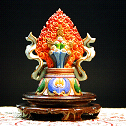
|
| 標題 | 2014年桑耶精舍月曆心宏法師法語 (2014 Calendar Dharma Words with Ven. Shinhong Shih) |
|---|---|
| 日期 | 2013-12-18 |
【面對問題、處理問題;解決問題、放下問題。】
To Face Daily Problems by Positive Attitude,
To Arrange Different Problems within Peaceful Mindfulness,
To Resolve Various Problems by the Ultimate Wisdom,
Let All Kinds of Problems Go through the Peaceful Compassion.
我們與其、嘴巴上總是羨慕、別人外在的成果;
為什麼不反過來、要求自己的內在,
真實地透過修持的力量,並且努力去改變自己的身口意呢?
Instead of always praising and/or admiring others of their accomplishments, why don’t we turn around to look at our inner self, develop strength through serious practice, and put in effort to improve our actions, speech and mind?
2013-12
在修行的道路上,自己要常常地、「自我鼓勵」的這種力量,是最強烈的、也是最長遠的。而「持續地學習正法」,是鼓勵自己、時常地保持心性的警覺、最重要的方式之一。如果沒有升起這種警覺,那要努力地尋找、能夠鼓勵自己的各種方法。
Self-encouragement/self-motivation is the most powerful means and long-lasting one that is needed in our daily practice. The wish to continuously learn the Dharma is one of the most important ways to encourage/motivate oneself as well as to maintain awareness of the mind. If we have not attained such awareness, we should diligently seek different ways to encourage/motivate ourselves.
2014-1
大乘禪修,不是要去捨棄一切境界,而找一個特別的外境來修持;而是、在一切境界生起的當中,不管它的好、與壞的當下,而去訓練你的內心,保持你內心的正念與正知,這個叫轉念 (Mind Transformation),這個才叫作:「真正的大乘禪修」。
Mahayana meditation does not aim to abandon all thoughts/circumstances that arise, and find a special external environment to practice. It actually teaches one to train one’s mind and maintain mindfulness and awareness, regardless of good or bad thoughts/circumstances. This is called “Mind Transformation”, and this practice is the true Mahayana meditation practice.
2014-2
真正以歡喜心、來願意學習清淨的正法;與持續地、勇敢去改變自我的人,才會跟清淨的、正法善知識有善緣。
With real rejoicing hearts, willingness to learn the pure Dharma, and unceasing courage to change oneself, one will then be able to have affinity with the pure Dharma as well as teacher/guru.
2014-3
禪修的特色,會使內心、漸漸趨向於寧靜、與祥和,因為真正的快樂,不在外邊的物質世界,所尋找得到;反而,要在內心的精神世界中,才能真實的發現與覺察得到。
The uniqueness of meditation is that it will lead the inner mind towards peace and harmony. Real happiness cannot be found from the external material world. Instead one should look within one's inner mind to discover and be aware of it.
2014-4
我們這一生修行,想要有高度與超越性的成就,除了壽命要夠長以外,最重要的是、要有修持的長遠心。(Long-terms Intention) 正所謂:「滴水可以穿石」,就是這個道理。
If we wish to have a high and transcending achievement in our present life's practice, besides having a long life, the most important is to have a long-term intention in cultivation of the mind. It has the same meaning as this saying「continuous drip of water will wear the stone away」.
2014-5
修行不要躲避自己的念頭,不論念頭的升起,是好、或是壞,要勇敢地面對、自己內心的真正感受,「選擇躲避」,是不能完全解決、各種煩惱不斷出現的種種問題。
Do not evade one’s own thoughts while doing Dharma practice, regardless whether the thoughts that arise are positive or negative. We must face our true feelings fearlessly. All problems appearing from our deluded mind will not be resolved if we choose to evade them.
2014-6
碰到善緣、要學習從口中表達感恩;碰到惡緣、要學習從心中不抱怨。因為惡緣、有時也是佛菩薩、來成就我無上菩提的各種考驗。善業、來成就我們,捨掉我們的貪心;惡業、來成就我們,捨掉我們的嗔恚心。
所以《普賢行願品》云:『所有益我善知識,為我顯示普賢行』, 其中「善」字的定義,不僅僅只限於「好的一面」,事實上,從勝義諦而言 ( the viewpoint of the Ultimate Truth),「好的」 與「壞的」,都是善的顯現。
When meeting good people/circumstances, learn to express our gratitude with words; when meeting challenging people/circumstances, learn to forgive in our hearts. This is because sometimes challenging people/circumstances are Buddhas & Bodhisattvas using skilful means to help us give rise and achieve to Ultimate Bodhicitta. Good karmic connection aids in our practice/self cultivation, so we should abandon attachment to them; whereas bad karmic connection also aids in our practice/self-cultivation, we should let go of our anger to them.
Therefore, according to <The Practices and Vows of Samantabhadra Bodhisattva> verse : "With all advisors good and wise, who aid me by explaining Samantabhadra's deeds”, although the verse seems to indicate only of the “good” advisors, but from the viewpoint of Ultimate Truth, it includes both “good” and “bad”.
2014-7
當我們與師長相處與互動時,有時我們會遇到:有無法理解的時刻,這一刻,我們應該要去思維和體會:「師長到底要、引導我們做什麼?」
這樣的修學,才會幫助我們進步;否則,不斷的懷疑、與反覆性的排斥,只會讓師生的善緣,變成修持的惡緣。
When we interact with our teachers, sometimes we meet moments that we do not understand them. At that instant, we should reflect and find out ‘what is our teacher trying to show us?’
It will help us improve if we keep practicing in this manner. If not, the continuous doubting and rejection will turn the good karmic relationship between teacher and student into a bad one.
2014-8
真正學佛的人,與一般世俗的人,真正的差別在哪呢?碰到境界時,學佛的人、他是不管境界的好、與壞,因為好與壞的感受,都是來自內心、自己強烈的好、惡的分別。
但是,反過來、觀看自己的念頭、與觀照自己的內心變化萬千;能夠清楚地、觀照自己的起伏雜念,才能進一步地、清淨與轉化你的心念,否則生生世世、任何人都很難、從輪迴裡、出離的。
What is the difference between a practitioner of Buddha's teachings and common lay people? The practitioner will not be affected by any good or bad circumstances. He/she knows that it is the mind that differentiates between good and bad.
If one observes one's thoughts and clearly sees that the mind is constantly changing, one will then be able to make a step forward, to purify and transform one's thoughts. Else no matter in how many lifetimes, it will be very difficult for one to be free from the cycle of birth and death.
2014-9
如果我們能:「常將生死、掛在心頭」,就會清楚地、知道自己:
在這一生中,到底自己、所要選擇的是什麼?
If we constantly think of “birth and death”, we will clearly see and know the choices we want to make in this life.
2014-10
佛教的修行者,要有長遠的願心;修持時,不是孤單地、一人盲修瞎練。但是,要掌握住修持的重點,那就是:
要能調伏自己千變萬化的身心;將修持的功夫,能安住在、清淨的正法上。所以有時、不要太在乎、外在所顯現的形象;以及別人外來、是是而非的各種評論。
Buddhist practitioner need to have a continuous long term vow/aspiration. Do not isolate oneself and practice blindly without proper training. One needs to grasp the important point: to tame the ever-changing mind and accept the changes in the body. Let the practice rest upon the pure Dharma. Do not be too concerned about the external projections and frivolous comments made by others.
2014-11
在實踐菩薩道時,我們應該不斷地學習:
特別是當我們、站在生命的十字路口時,如何作一個更好、與更有智慧的選擇,有時它是、相當困難的。
這也就是,為什麼我們、需要良師的引導,與善友的提攜。
It is a continuously learning process when we walk the bodhisattva path. Especially so when we are standing at a cross road. How to make a better informed and wise choice is sometimes not easy, which is why we need good teachers to guide us and good dharma friends to support us.
2014-12
真正的「不執著」(Non-Attachment; Non-Grasping) 的含義,就要清楚地、觀照到:「一切萬法,沒有永恆不變的實體」。
猶如用手掌,去臉盆裡撈水,水流經過你的手掌;但它們也會從你的手指、與細縫中流掉;所以,最後手掌上,是沒有水的,這就是「不執著」的真實顯現的深義 (profound and deeper meaning)。
The True meaning of “Non-Attachment” or “Non-Grasping” is to clearly see and realize that “all phenomena do not exist permanently.”
It is just like using the palm of our hand to scoop water from a pail. The water will flow from the fingers and sip through the gaps in between the fingers. Eventually, there will be no water left on the palm. This is the inherent truth of non attachment or non grasping (the meaning is profound and deep).
| 附件檔案 | 2014_SBA Calendar_Dharma Words  |
|---|---|
| 參考連結 | |
| 張貼人 | sba |
| 最後修改時間 | 2013-12-20 PM 12:09 |







